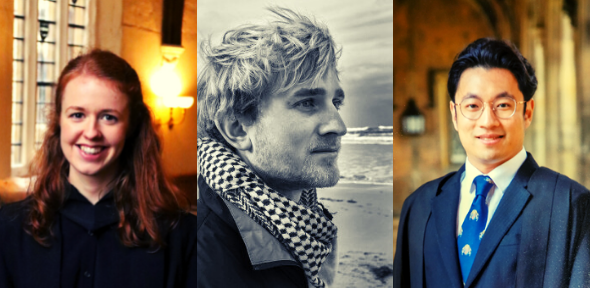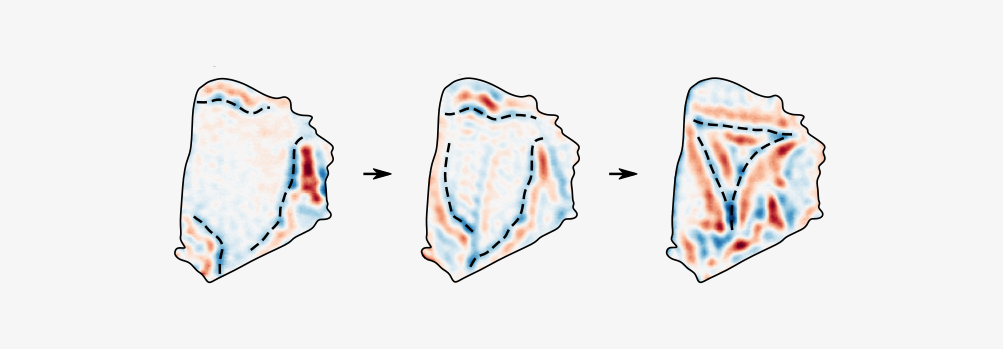
Many congratulations to the winners of the Cavendish Annual Thesis Prizes for Postgraduate Students, which recognise exceptional computational, experimental, and theoretical physics research by PhD students.
The prizes are awarded annually based on a peer-reviewed paper reporting research undertaken during their PhD at the Cavendish. In a record-breaking year which has seen so many high-quality nominations, the judging panel recognised the work of three outstanding PhD students whose projects look into solving some of the most pressing challenges of the 21st century.
From developing low-cost lab techniques to study the performance of batteries, to solving quantum equations with supercomputers to control and exploit topological materials, and constructing a promising torsion-based theory of gravity, the 2022 prize-winners tell us more about their PhD.
Alice Merryweather - Winner of the Cavendish Prize in Experimental Physics
“Operando optical tracking of single-particle ion dynamics in batteries” (Nature, June 2021)
Alice Merryweather is doing her PhD jointly in Akshay Rao's group at the Cavendish and Clare Grey's group at the Department of Chemistry.
“Effective energy storage technologies are essential for green development, especially in enabling the widespread adoption of electric vehicles. To help develop faster-charging and longer-lasting batteries, scientists need to understand the processes occurring inside an operating battery, to identify their performance limitations. Currently, visualising the active battery materials as they work in real time requires sophisticated synchrotron X-ray or electron microscopy techniques, which can be difficult and expensive.
"In my work, I apply a low-cost lab-based optical microscopy technique to study lithium-ion batteries. I have examined individual particles of LiCoO2, an electrode material which stores and releases lithium-ions during battery discharging and charging. Visible light from a laser is sent into the battery through a small glass window.
“As the battery charges or discharges, the local concentration of ions in the material changes, which causes the amount of light that scatters back from the material to change. Importantly, images of the scattered light can be acquired as fast as 1 ms, allowing me to watch rapid phase transitions moving through the active particles in real time and under realistic cycling conditions.
“This technique can be applied to study many different types of battery material and could be an important piece of the puzzle in understanding and developing next-generation batteries.”
Bo Peng - Winner of the Cavendish Prize in Computational Physics
“Topological phonons in oxide perovskites controlled by light (Science Advances, November 2020)
Bo Peng is a third-year PhD student working with Dr Bartomeu Monserrat.
“In my research, I use supercomputers with hundreds of thousands of CPUs to simulate the quantum behaviour of materials.
“I work with an exciting class of materials called topological, characterized by their ability to store and process quantum information through the braiding of the trajectories of microscopic particles – which makes them a promising platform for the design of robust quantum computers.
“However, controlling those properties at will relies on the ability to modify the motion of microscopic particles inside the material, which had proven impossible so far for materials of interest.
“I have demonstrated for the first time how we can accomplish this in a relatively simple setup, opening the doors for exploiting these materials in new technologies.”
William Barker - Winner of the Abdus Salam Prize in Theoretical Physics
"Systematic study of background cosmology in unitary Poincaré gauge theories with application to emergent dark radiation and H0 tension” (Physical Review D, July 2020)
William Barker is a Research Fellow at Girton College and is doing his PhD with Anthony Lasenby, Mike Hobson and Will Handley in the Cavendish Astrophysics Group and the Kavli (KICC).
“My thesis is on "Gauge theories of gravity". Our Group is concerned with finding alternatives to the current favourite theory of gravity, general relativity, which the Cavendish has been working on since the '90s. In particular we are interested in "spacetime torsion", a kind of geometric "twisting" that spacetime can have - when the main point of general relativity is that the gravitational field is understood to be "spacetime curvature".
“Torsion and curvature are perfectly analogous concepts, but both are pretty hard to imagine in four dimensions! Based on two amazing tour-de-force papers written by former Cavendish Ph.D. student Yun-Cherng Lin in 2018/19, we have spent the last few years constructing a promising torsion-based theory of gravity.
"Our theory recovers certain key predictions of general relativity, but it also shows some promise in explaining the so-called "Hubble tension" problem, which is the fact that our Universe today seems to be expanding up to 10% faster than general relativity would predict.”
The winners received their prizes and presented their award-winning work as part of the graduate student conference on Thursday 25 November. Each prize comes with a cheque of 500 pounds.
The Abdus Salam Prize for Postgraduate Student Research has been donated to the Department to be presented to a Research Student at the Cavendish.



